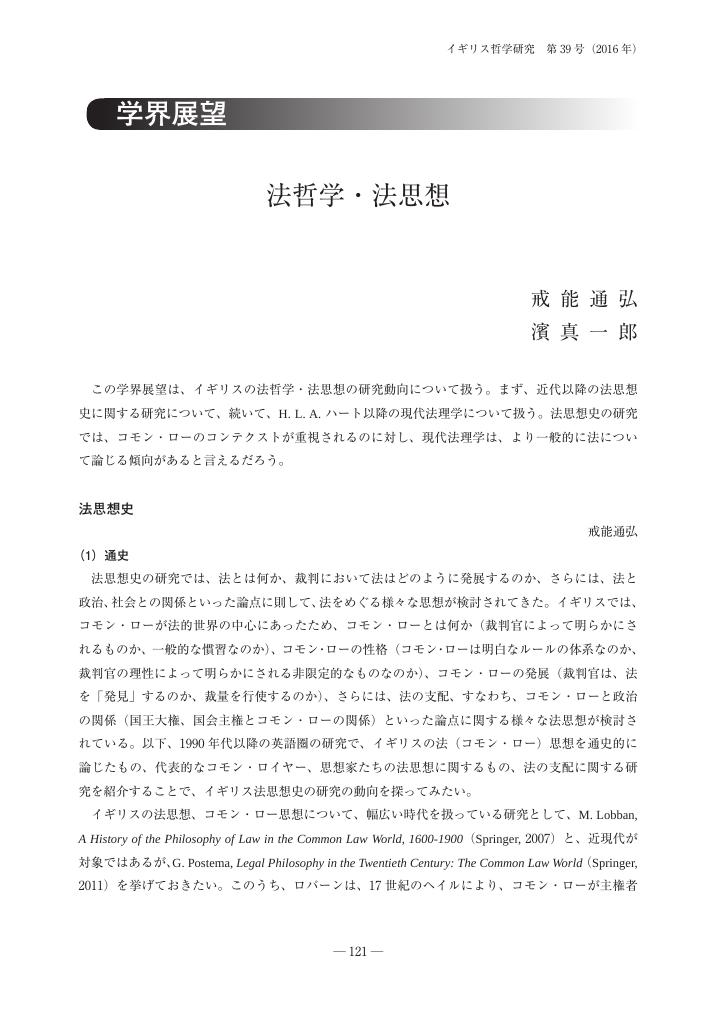10 0 0 0 OA 法哲学・法思想
- 著者
- 戒能 通弘 濱 真一郎
- 出版者
- 日本イギリス哲学会
- 雑誌
- イギリス哲学研究 (ISSN:03877450)
- 巻号頁・発行日
- vol.39, pp.121-127, 2016-03-20 (Released:2018-03-30)
- 著者
- 戒能 通弘
- 出版者
- 日本イギリス哲学会
- 雑誌
- イギリス哲学研究 (ISSN:03877450)
- 巻号頁・発行日
- vol.35, pp.5-19, 2012-03-20 (Released:2018-03-30)
- 参考文献数
- 31
This paper focuses on the development of the English concept of the ʻrule of lawʼ, analysing Edward Coke, Matthew Hale and William Blackstoneʼs works. I will demonstrate the diversity of this concept, as against the prerogative. On the other hand, the rule of law concept has been almost consistently under the sway of parliamentary sovereignty. The history of the English rule of law concept is one of formalisation. Cokeʼs restraint of the prerogative by ʻreasonʼ was replaced by Haleʼs restraint by ʻknown lawʼ. The English rule of law did not intervene where the legislatures acted in formally correct ways.
2 0 0 0 IR 近代英米法思想の展開(2)ブラックストーン、マンスフィールド、ベンサム
- 著者
- 戒能 通弘 カイノウ ミチヒロ Kaino Michihiro
- 出版者
- 同志社法學會
- 雑誌
- 同志社法学 (ISSN:03877612)
- 巻号頁・発行日
- vol.61, no.7, pp.2149-2233, 2010-03
論説(Article)ブラックストーン、マンスフィールド、ベンサムの法思想をルールという観点から、伝統的なコモン・ロー理論と対比的に捉える。Contrasting the legal thought of Blackstone, Mansfield and Bentham with the more traditional Common Law Theory in terms of the idea of rules.
1 0 0 0 OA ベンサムの法実証主義、功利主義と近代
- 著者
- 戒能 通弘
- 出版者
- 日本法哲学会
- 雑誌
- 法哲学年報 (ISSN:03872890)
- 巻号頁・発行日
- vol.2007, pp.80-90, 2008 (Released:2021-03-31)
The legal thought of Jeremy Bentham (1748-1832) is, like his political theory, developed to respond for the modernization of the British society by the industrial revolution. Also, Bentham can be depicted as a typical modern theorist who thought to develop a universally applying prescriptive theory. The purpose of this paper is to reexamine the theoretical, social background and the substance of Bentham’s legal positivism and utilitarianism by the viewpoint of the ‘autonomy of law’ and the ‘universality’, which are particularities of the modernity. In this paper, at first, I want to show the modernity of Benham’s legal thought by comparing it with the preceding classical common law theory. The difference between Bentham’s legal thought and the classical common law theory depends on the difference of the respective view of the community or the society. Bentham perceived that the gemeinschaft or the ‘society of a same value’, which the classical common law theory presupposed, has fallen after the Industrial revolution and proposed the autonomy of law to resolve the ‘co-ordination problem’. In this paper, I also want to argue the codification theory of Bentham, which has been my mainresearch project. To accomplish the greatest happiness of the greatest number, Bentham tried to replace the common law with his Pannomion (comprehensive code of laws), which is thought to be universal. If one of the features of the modernity is the pursuit of the universality, we can find a typical example in Bentham’s theory of codification.
1 0 0 0 OA 書評
1 0 0 0 OA 書評
1 0 0 0 OA 書評
1 0 0 0 OA ベンサムにおける国際正義論
- 著者
- 戒能 通弘 Michihiro Kaino
- 出版者
- 同志社法學會
- 雑誌
- 同志社法學 = The Doshisha Hogaku (The Doshisha law review) (ISSN:03877612)
- 巻号頁・発行日
- vol.57, no.1, pp.27-113, 2005-05-31
論説
1 0 0 0 IR 近代英米法思想の展開(4・完)ホームズ、パウンド、ルウェリン
- 著者
- 戒能 通弘
- 出版者
- 同志社法學會
- 雑誌
- 同志社法学 (ISSN:03877612)
- 巻号頁・発行日
- vol.63, no.1, pp.631-717, 2011-06
コモン・ローのコンテクストにおけるホームズ、パウンド、ルウェリンの法理学の検討
1 0 0 0 OA ベンサム研究の新傾向について
- 著者
- 戒能 通弘
- 出版者
- 日本法哲学会
- 雑誌
- 法哲学年報 (ISSN:03872890)
- 巻号頁・発行日
- vol.2002, pp.123-130, 2003-10-20 (Released:2008-11-17)
- 参考文献数
- 36
1 0 0 0 IR コモン・ローのコンテクストとハート、ドゥオーキン (深田三徳教授古稀記念論集)
- 著者
- 戒能 通弘 カイノウ ミチヒロ Kaino Michihiro
- 出版者
- 同志社法學會
- 雑誌
- 同志社法学 (ISSN:03877612)
- 巻号頁・発行日
- vol.64, no.3, pp.929-965, 2012-09
Article
- 著者
- 戒能 通弘
- 出版者
- 同志社大学
- 雑誌
- 同志社法學 (ISSN:03877612)
- 巻号頁・発行日
- vol.61, no.7, pp.2147-2233, 2010-03
1 0 0 0 <研究ノート>世界の立法者,ベンサム
- 著者
- 戒能 通弘
- 出版者
- 同志社大学
- 雑誌
- 同志社法學 (ISSN:03877612)
- 巻号頁・発行日
- vol.51, no.3, pp.165_a-94_a, 1999-09-30




